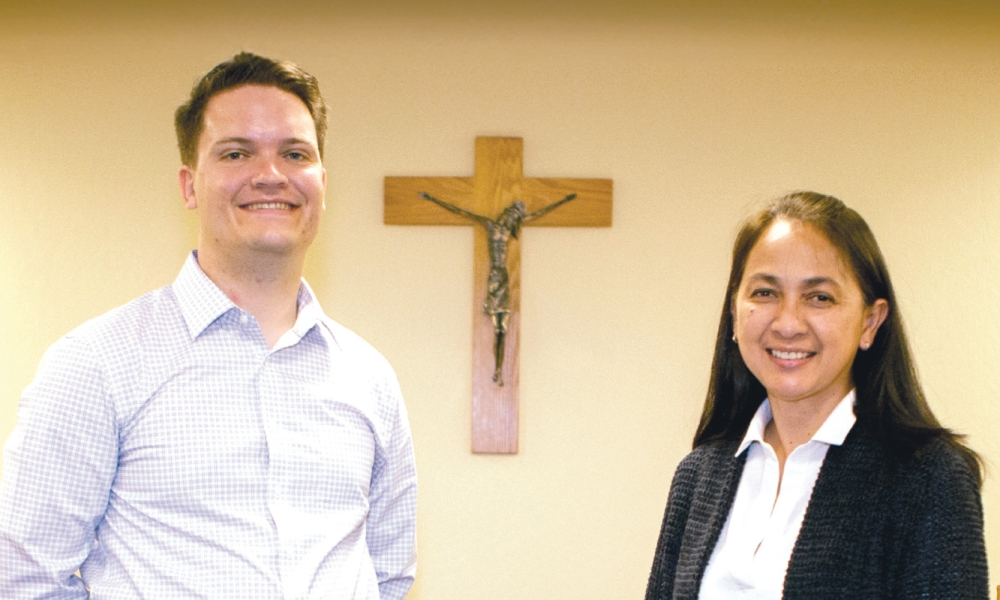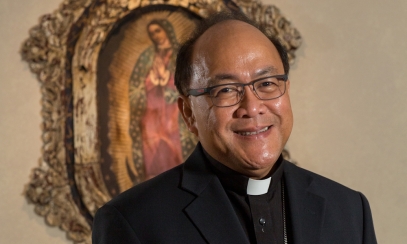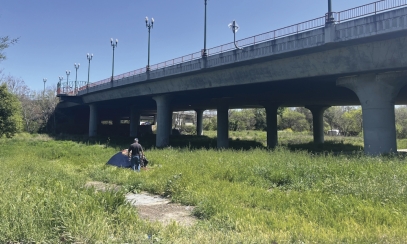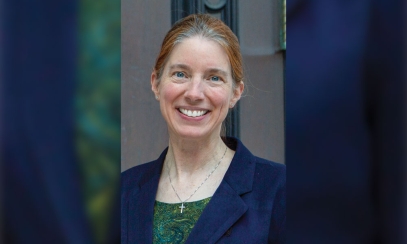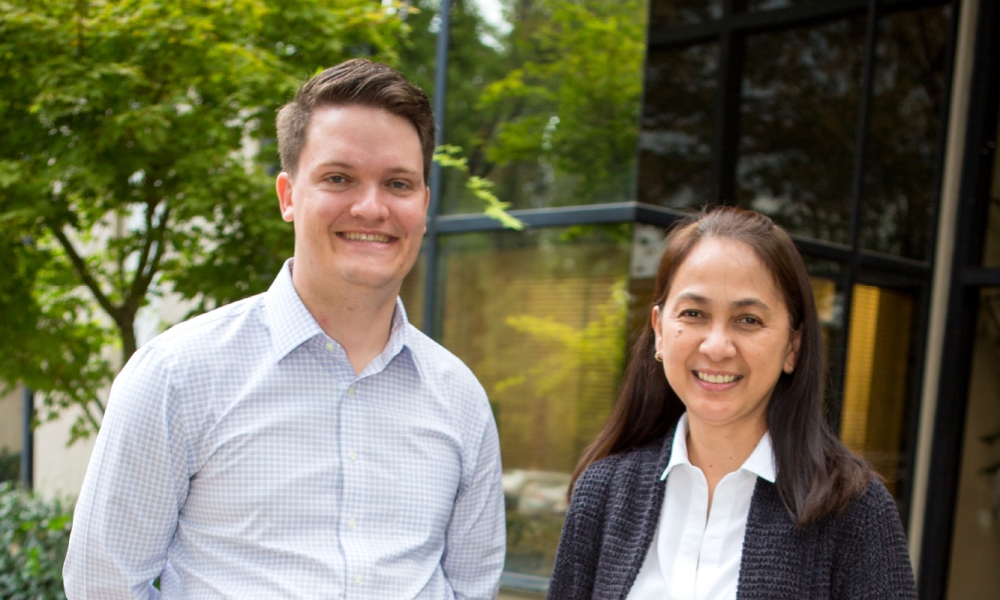
Called to Catholic Education
For educators universally, and perhaps especially those in Catholic schools, the line between home and work, life and profession, vocation and personal identity, becomes so slim it disappears. Still, for others, it never existed.
For educators universally, and perhaps especially those in Catholic schools, the line between home and work, life and profession, vocation and personal identity, becomes so slim it disappears. Still, for others, it never existed.
Both Maria Victoria Hinkle and Nathanael Baugnon-Edwards can testify to the unique experience of being Catholic-educated educators. For each — Maria is a principal and Nathanael a teacher — the essence of their vocations means transforming lives and allowing themselves to be transformed as school leaders, as Catholics, and quite simply, as human beings.
For each educator, the overlap of faith, school, work, identity, family, and education, which began in childhood, is being intentionally carried through into their respective professions today.
Nathanael Baugnon-Edwards teaches junior high English Language Arts and Religion at St. Mary of the Immaculate Conception in Los Gatos, where he is also the student council moderator. His family are parishioners at St. Lucy's in Campbell.
Nathanael Baugnon-Edwards is a middle school English Language Arts instructor at St. Mary of the Immaculate Conception School, Los Gatos.
Nathanael is a father to 18-month-old daughter Frances and husband to Talia, another Catholic educator who runs the afterschool program at St. Mary in Los Gatos, where he teaches. “That is one of the graces of having a smaller Catholic School community that is tightly knit. I give a ton of props to my principal because she has been flexible with us and helped make it manageable for Talia and me.”
When his day ends, there is a toddler swap and sometimes he finishes faculty meetings with his daughter Frances bouncing on his lap. “But this is a Catholic school, and not only is everyone understanding, but they have also ‘been there’ and have assured me, ‘It is okay; most of us have kids. We get it.’ Where else can that happen?”
Teaching to Form Lives
That same care and compassion amongst his colleagues also typifies St. Mary School’s overarching goals for the students. Nathanael puts it this way, "All of our students are known, and known by name and this has been a theme at Saint Mary's."
Baugnon-Edwards explains what this means in the classroom. “There are several times where a student just needs more confidence, and you have to encourage them and show them love in moments where they struggle.” It is a responsibility that overlaps naturally with his faith. “Knowing that, in our students, there is the face of God means there is this constant call to love more and more, repeatedly. I think that challenge is a big part of what attracted me to teaching.”
One considerable influence on Nathanael as a teacher was reading the biography of John Paul II. “He talks so much about this idea of accompaniment. A teacher must do that since the students are the main characters, the protagonists, and we are there to help support them.”
Part of that accompaniment also is preparing them for their lives outside the classroom, forming students with the greater community and the world in mind. “I think that in today’s world, Catholic schools are a good opportunity to help our students understand who their neighbor is and care for people with whom they disagree.”
His Journey to Catholic Education
Baugnon-Edwards's father is a deacon, and both of his parents were Catholic school teachers. He worked as a summer camp counselor for several years, an experience he credits with bringing him out of himself and sparking his vocation to teach. “I have always been very introverted, which took me out of my shell. Just the act of teaching taught me what I want to do.”
After college, he taught for three years in the Pine Ridge Reservation in South Dakota through Red Cloud Volunteer Corps, where he met and fell in love with his wife, a Santa Rosa native, and where his desire to teach deepened. “I knew I wanted to teach, and Santa Clara University had a program to keep teaching while doing my master's at the same time, which was attractive.” Years later, they relocated to Silicon Valley to begin their family, which unquestionably included working for Catholic schools.
Teaching as Personally Transformative
"If you don't get good at forgiving, empathizing, and trying to understand where a student is coming from — you know, loving people, no matter what they're doing — then you're not going to stay a teacher.” Signing up to teach others also equals personal transformation, in his experience. “Every day, I have opportunities to learn how to be more human. I fully believe that being an educator has taught me how to be a better father and a better husband.”
While the value of personal growth is inestimable, there is equal acknowledgment that it is a sacrifice, and finding a balance remains a continual challenge. Nathanael says frankly, “Education certainly is not an easy profession. The demands on teachers are never-ending. Teaching, like many professions, will consume you if you let it. Teachers certainly must learn to set firm boundaries.”
The Challenge of Affordability
Baugnon-Edwards shared that he would like to remain in the Diocese of San José and eventually become a deacon like his father. “We are a young family that is very actively Catholic. We want to raise our daughter the way that we were raised. We would like to set roots here,” he said. But the challenge of affording private education, let alone living in Silicon Valley, is a constant reality for young families like the Baugnon-Edwardses. This reality has led to fair employee compensation becoming a key objective in the Diocese of San José’s upcoming pastoral plan for structural renewal.
Baugnon-Edwards expressed already feeling great satisfaction with the recent diocesan decision to provide paid paternity and maternity during the first eight weeks of a newborn’s life. "That was huge, and the diocese has done an awesome job of improving teacher pay over the last couple of years. But housing prices rise as fast or faster.” Couples like Nathanael and Talia must grapple with the reality that affordability may prevent them from making the Diocese of San José their permanent home.
Teaching as coming home and becoming a home for others
In many ways, Catholic schools become that home for students, educators, and the greater community alike. Nathanael shares his immense joy at interacting with students. “Every day, I have opportunities to learn how to be more human and witness the students’ actual tangible growth in the moments that they face.” He shares his reaction even when there are hard days in the classroom. "It's still: I love those kids. They are my kids.”
This collaborative setting in a loving environment, where one-on-one interaction with families is commonplace, also sets Catholic education apart. “Teaching is so communal if you are doing it right. I have had parents call or email me to update me about what is happening in their family life or to inquire if anything is happening with the kids socially. Catholic schools team up with them as the primary educators.” This is all part of how, at St. Mary and at all Catholic schools, students, families, and educators are known by name, literally and figuratively, as valued community members.
Maria Victoria Hinkle is the new principal at St. John Vianney School after serving as a teacher and administrator at St. Victor School for 22 years. She serves as a lector at her home parish, St. Francis of Assisi, where her husband and son also sing in the choir. Joy comes to Maria Victoria in many ways, especially through her family.
Maria Victoria Hinkle, Principal of Saint John Vianney School, San José
When asked why people should consider sending their kids to Catholic schools, Maria Victoria Hinkle, an educator who worked for more than 29 years before becoming principal, replied, “Catholic education changes not just the intellect, but it also forms the whole child.” And as far as why someone should consider teaching at one: "It is a vocation. It changes the educator’s life as much as it changes the lives of children forever.”
Her Journey to Catholic Education:
Maria Victoria grew up in the Philippines and was educated at the Assumption Convent in Manila. She admits that it is difficult for her to tell at which point her vocation to teaching started, but she credits her mother. “I was always in love with teaching. It began when I witnessed how teaching brought so much joy to my mom. She changed so many lives and her students loved her. My mom planted the seed that has grown into my vocation.”
As early as the 6th grade, Maria Victoria prepared children for their First Holy Communion. “I remember those Saturday mornings when my sister and I went and taught Catechism to street children — those who lived in the squatters’ area.” As part of her school’s service program, she joined immersion programs where they lived with homeless families. These experiences taught her to be grateful for her blessings while awakening a sense of responsibility to serve others. Although her teaching vocation began in the Philippines, this continued when she came to the United States in 2001. She taught at St. Victor School, where she later became principal.
Teaching as Forming the Whole Person
Now principal at St. John Vianney School, Maria Victoria continues to serve her new school community, “Being a Catholic school teacher or administrator calls us to serve by educating the young towards the transformation of society.” She reiterated this sentiment throughout her interview and along with a quote from St. Marie Eugenie, who founded the Religious of the Assumption, the same order which instructed her, her sisters, and her mother in the Philippines: "To educate is to set a person free.” These words have shaped her understanding of her mission and vocation as an educator.
According to Maria Victoria, setting students free goes far beyond the classroom. “When we educate students, it goes beyond making an academic difference. It is in the formation of the whole person, of bringing the students back to Jesus and to whom they belong. This is how each child realizes God’s purpose for their being.”
But this does not mean that academics are not important. “Students visit and say things to me like, ‘Mrs. Hinkle, remember when we read To Kill a Mockingbird in class? Remember the mock trials that we had?’ They tell me how that inspired them to join or begin debate teams. It is important to realize that students take even the simple things we do and say in the classrooms with them forever,” she shared.
The Kids Come Back
Maria Victoria summarizes the difference faith plays in the vocation of an educator as being the profound they show students which is one of the reasons the students often return to visit their former elementary schools. “When we are faced with classroom challenges, we never give up on our students because God never gives up on us. A Catholic educator is called to believe in every student and help them believe in themselves.” When they return, post-eighth grade, high school, or even college graduation, Maria Victoria and all educators alike witness the fruits of their labors. “Some come back just to say how well we taught them to write a paragraph. Others come back and say more profound things like, ‘You made such a big difference in my life’ or, ‘Thank you for not giving up on me and helping me not give up on myself either.’” This is because Catholic schools seek to provide students and families a place where they can ground themselves in what really matters.
The Catholic School Solution
Maria Victoria believes Catholic education provides a solution to today’s worldly distractions by anchoring their communities in what is essential in life. “For youth, the combined overuse or misuse of technology, and peer pressure, can genuinely cause them to lose faith in God.” Catholic schools are the antidote, connecting students with their potential best selves and with God daily. This places a profound responsibility on Catholic school educators. “The reality is that Catholic school teaching is much more demanding because you invest your whole person, not just your knowledge. You form students academically while forming their faith and developing their sense of responsibility in making the world better.”
Teaching, Personal Transformation, and Mission
A lifetime in Catholic education has meant continual opportunities for Maria Victoria to deepen in her own faith. “In bringing children closer to Jesus, I am getting closer to Jesus myself. For me, the biggest gain in serving in Catholic education is that it brings me back to myself. Outside of being with my son and my husband, it is where I find deep joy.”
Maria Victoria’s clarity in vision and mission as a Catholic School leader is also inspired by the strong leadership in the Department of Catholic Schools. “I have great confidence in our Superintendent and that makes a difference! Jennifer Beltramo is very clear about the mission of the Church and the direction of Catholic schools.” That confidence compels Maria Victoria to continue in her mission of unclipping students’ wings and setting them free through education. She does not want to keep it to herself either. “If anyone is thinking about teaching in a Catholic school, I highly recommend the Diocese of San José!” MN

